#that one hector and andromache scene in the iliad>>>>>
Explore tagged Tumblr posts
Text
odypen this, helen and menelaus that WHAT ABOUT HECTOR AND ANDROMACHE!?
#WHY DOES NO ONE TALK ABOUT THEM#i still love odypen and will not stop talking about them#that one hector and andromache scene in the iliad>>>>>#the iliad#homers iliad#homeric epics#the odyssey#homers odyssey#hector of troy#helen of troy#helen of sparta#hector and andromache
256 notes
·
View notes
Text
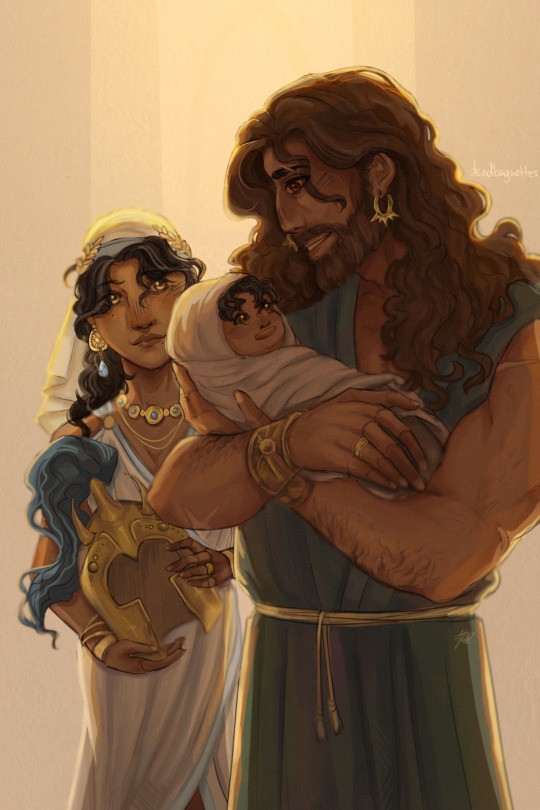
“Then glorious Hector kissed his darling son
and took him in his arms to rock and cuddle”
- The Iliad 151, Wilson
#art#the iliad#iliad#hector of troy#hektor#andromache of troy#hector and andromache#scamandrius#astyanax#bro this scene makes me so ill it’s not even funny#hector my beloved andromache my beloved THEY DESERVED BETTER AUUUUGHH#my beloveds#based off that scene in book 6#and that one pottery art#deadbaguettesart
2K notes
·
View notes
Text

😔
#the iliad#hector x andromache#andromache of troy#maybe someday I’ll actually finish a fic instead of waking up from a dead sleep at 2am and writing one scene and abandoning it but#todays not that day goodnight
29 notes
·
View notes
Text
"In a famous scene in Book 6 of 'The Iliad,' Andromache, accompanied by her baby son and enslaved nurse, begs her husband, the great Trojan warrior Hector, to adopt a less dangerous military strategy, rather than face the enemy on the open plain. He refuses, and they part for the last time. In the original Greek, the wife and husband each use the same word to address one another: 'daimonios.' The word is cognate with 'daimōn' — 'spirit' or 'deity' (from which we get the English 'demon') — and presumably suggests, in its most literal sense, that a person is influenced by some superhuman power. Yet it is surprisingly common in Homer, generally used when one individual addresses another. It is sometimes taken to suggest little more than 'Sir' or 'Ma’am'; sometimes the context suggests it is negative ('possessed' or 'crazy'), sometimes the opposite ('You marvelous person!').
Many translators of this scene use different renditions of the word in the two instances. In Lattimore, Andromache calls Hector 'Dearest,' while he calls her 'Poor Andromache!'; in Fagles, Andromache calls Hector 'Reckless one,' while Hector calls Andromache 'Dear one'; in Fitzgerald, Andromache uses 'Wild one,' and Hector uses 'Unquiet soul' (a lovely phrase lifted from Shakespeare’s 'Merchant of Venice' — although oral poetry does not abound in clever literary quotations). I felt it was important to use the same word for both the wife addressing the husband, and the husband addressing the wife, to echo the symmetry suggested in the original, and I used 'strange' in both instances ('strange man … strange woman,' echoing the different genders of the original). I hoped that this word might hint at the Greek term’s suggestion of something unusual, perhaps divine or inhuman. This heartbreaking scene evokes both deep intimacy and profound estrangement between husband and wife, one of whom will soon be dead and the other enslaved."
- Emily Wilson, from "Emily Wilson on 5 crucial decisions she made in her ‘Iliad’ translation." Washington Post, 20 September 2023.
#i'm so intrigued by this new iliad translation that just came out!#emily wilson#quote#quotations#homer#the iliad#hector of troy#andromache of troy#hector and andromache#ancient greek language#classics
454 notes
·
View notes
Text
A (not exhaustive) inventory of Astyanax's death and survival.
In the Little Iliad, Neoptolemos is the killer. In the Iliou Persis, Odysseus is the killer.
In the Trojan Women we don't actually know who does the deed, "merely" that Odysseus is singled out as the (major) voice who argued for his death. As Andrew Erskine in Troy Between Greece and Rome points out (referencing another academic as well), given the lack of detail in what's left to us, Odysseus might well have been involved in Astyanax's death in the Little Iliad as well, in the same role he has in here in the Trojan Women.
Seneca (Troades) follows Euripides in the public deliberation and has Odysseus being present for Astyanax's death, but he has Astyanax leap voluntarily. (Excuse me, WTF.)
Quintus of Smyrna, in his Posthomerica, has the killing be done by "the Greeks". Not just the deliberation like in the Trojan Women, but "they" seized him and tossed him from the wall. Whether intended or not, it makes it read a little like a mob scene. (edited to add this, because I'd forgotten to check.)
Tryphiodoros, in the Taking of Ilios, has it again be Odysseus.
So what we get is that even when Odysseus isn't actively the hand that commits the deed, he's the (first? major? leading?) voice in claiming it "needs" to be done. For the ~safety of Greece~, of course.
So, now we come to myths and stories of Astyanax's survival. It's mostly here the "not exhaustive" disclaimer applies. For a lot of the Medieval sources (where this idea flourishes) I can't double check if they say anything about who/how Astyanax survives.
With that said; the Medieval manuscripts aren't the earliest ideas of Astyanax's survival!
One is late Classical or earlier; Dionysios of Halikarnassos reports of the Ilians (that is, the Anatolian Greeks of the "modern" Ilion/Troy, built somewhere after ~1000 BC) had a founding legend that involved Astyanax and Askanios. Given that Astyanax can approach his cousin after being released by Neoptolemos, presumably Neoptolemos didn't kill Astyanax but rather take him along into slavery with his mother and Helenos.
I'll just include this screencap from Troy Between Greece and Rome for the next bit since it's easier:
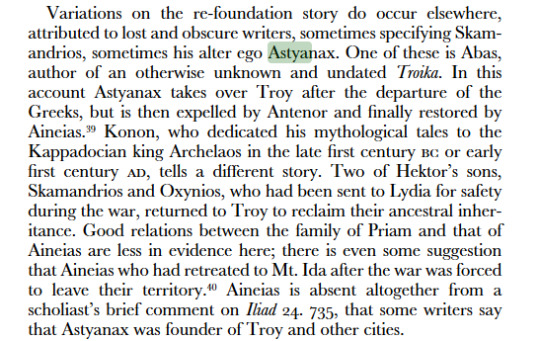
On to the Medieval sources; the absolute earliest appearances of Astyanax here is as the founder of the Franks, now named Francion/Francus. French Wikipedia has a note to an author that says that Astyanax's survival was effected by (unnamed in the text and note) Medieval authors by the Greeks softening up and ending up not killing Asyanax because of his beauty.
Next is the "Andromache swaps Astyanax for another child and the Greeks (more like Odysseus) is tricked and kills the substitute". It has several appearances/uses, but the earliest (at least by the list in Wikipedia) seems to be Boiardo's Orlando Innamorato (1495).
While being unable to, like, check if anyone is named as the rescuer in some of these (Wiki also has an unsourced mention of Talthybios), in general we seem to land on either Neoptolemos or, in later stories, Andromache herself. I wouldn't think Neoptolemos ends up not killing Astyanax out of the goodness of his heart, more as a way to control Andromache, but there it is either way. Odysseus is only ever an obstacle to be worked around, which isn't odd given how often he is either the killer, or, maybe far more important, the voice to argue that Astyanax need to die. Not so odd he'd then be construed in later stories as the character to be specifically tricked by the child-swap.
I'll put the sources under the cut!
(For the Little Iliad) Scholiast on Lycophr. Alex., 1268: "Then the bright son of bold Achilles led the wife of Hector to the hollow ships; but her son he snatched from the bosom of his rich-haired nurse and seized him by the foot and cast him from a tower. So when he had fallen bloody death and hard fate seized on Astyanax. And Neoptolemus chose out Andromache, Hector's well-girded wife, and the chiefs of all the Achaeans gave her to him to hold requiting him with a welcome prize. And he put Aeneas, the famous son of horse-taming Anchises, on board his sea-faring ships, a prize surpassing those of all the Danaans."
(For the Sack of Ilion/Ilioupersis) The Greeks, after burning the city, sacrifice Polyxena at the tomb of Achilles: Odysseus murders Astyanax; Neoptolemus takes Andromache as his prize, and the remaining spoils are divided.
(Note 136 to Apllodorus' Library, trans. Frazer) Compare Arctinus, Ilii Persis, summarized by Proclus, in Epicorum Graecorum Fragmenta, ed. G. Kinkel, p. 50; Eur. Tro. 719-739, Eur. Tro. 1133-1135; Eur. And. 8-11; Paus. 10.26.9; Quintus Smyrnaeus, Posthomerica xiii.251-257; Tryphiodorus, Excidium Ilii 644-646; Tzetzes, Scholiast on Lycophron 1263; Scholiast on Eur. Andr. 10; Ov. Met. 13.415-417; Hyginus, Fab. 109; Seneca, Troades 524ff., 1063ff. While ancient writers generally agree that Astyanax was killed by being thrown from a tower at or after the sack of Troy, they differ as to the agent of his death. Arctinus, as reported by Proclus, says merely that he was killed by Ulysses. Tryphiodorus reports that he was hurled by Ulysses from a high tower. On the other hand, Lesches in the Little Iliad said that it was Neoptolemus who snatched Astyanax from his mother's lap and cast him down from the battlements (Tzetzes and Paus. 10.26.9). According to Euripides and Seneca, the murder of the child was not perpetrated in hot blood during the sack of Troy but was deliberately executed after the capture of the city in pursuance of a decree passed by the Greeks in a regular assembly. This seems to have been the version followed by Apollodorus, who apparently regarded the death of Astyanax as a sacrifice, like the slaughter of Polyxena on the grave of Achilles. But the killing of Astyanax was not thus viewed by our other ancient authorities, unless we except Seneca, who describes how Astyanax leaped voluntarily from the wall while Ulysses was reciting the words of the soothsayer Calchas and invoking the cruel gods to attend the rite.
(Trojan Women, Euripides) Talthybius You that once were the wife of Hector, bravest of the Phrygians, [710] do not hate me, for I am not a willing messenger. The Danaids and sons of Pelops both command—
Andromache What is it? your prelude bodes evil news.
[…]
Talthybius They mean to slay your son; there is my hateful message to you.
Andromache [720] Oh me! this is worse tidings than my forced marriage.
Talthybius So spoke Odysseus to the assembled Hellenes, and his word prevails.
Andromache Oh, once again alas! there is no measure in the woes I bear.
Talthybius He said they should not rear so brave a father's son.
(Dionysios of Halikarnassos; Ant. Rom. 1. 47. 5–6) Aineias . . . sent Askanios, the eldest of his sons, with some of the allies, mainly Phrygians, to the land called Daskylitis, where the Askanian lake is, since his son had been invited by the inhabitants to rule over them. Askanios did not dwell there for long. When Skamandrios and the other descendants of Hektor approached him after Neoptolemos had released them from Greece, he went to Troy and restored them to their ancestral kingdom.
149 notes
·
View notes
Text

Shinji’s awakened Persona finally makes his debut! Hector of Troy!
Hector was the crown prince of Troy during the events of The Iliad, and the elder brother of Paris and the cursed prophetess Cassandra, as well as a number of other siblings (between sixty and as many as eighty-three other siblings, depending on what source you’re looking at).
He was the leader of the Trojan army and respected as a great warrior by both his own people and the enemy Greeks. Under his command, the Trojan army holds off the Greek siege of the city for nine years. Ultimately he dies in battle against Achilles, and The Iliad closes on his funeral.
Even more than his battle prowess, however, he was known for simply being a good man. He was frequently described as noble and dutiful, and as someone who valued peace despite his skill as a fighter. He was noted as being kindhearted as well– during his funeral, Helen (you might have heard of her) says that he was the only person in Troy who still showed her kindness despite her role in catalyzing the war.
He’s also especially well known for being a family man– one of his most well-known scenes in The Iliad involves him comforting his wife Andromache and their son Astyanax as he prepares to leave for the battle that they both know he won’t survive. His son– who is only about a year old– gets frightened by the war helm Hector is wearing and only calms down when Hector removes it and comforts him, saying a prayer for him to grow up brave and strong and to make his mother proud.
When coming up with Hector’s design as a Persona, we wanted him to still be mounted, since the horse is such a unique element of Castor’s design and we wanted that bit of continuity, and also as a nod to the most famous of Hector’s epithets: “tamer of horses.”
This particular detail goes undescribed by Minato’s narration, but Hector’s mount tapers off into a shape reminiscent of an amphora, reflecting how Castor’s tapered off into a single hoof.
The helmet he carries is a reference to the scene between Hector and his son described above, and it being shaped like a horse skull is another reference to the “tamer of horses” epithet. He’s armed with a shield and spear as he is most frequently depicted in The Iliad and in contemporary art. Similar to how Caesar in canon/Cincinnatus in this fic have different animations when using physical or magic skills, Hector does as well: when using a physical skill, he points the spear at the target; when using an SP skill (so… Debilitate, and only Debilitate lol) he raises the helmet aloft.
Lastly, his color scheme, aside from the bronze elements, is based off of red figure pottery like this:
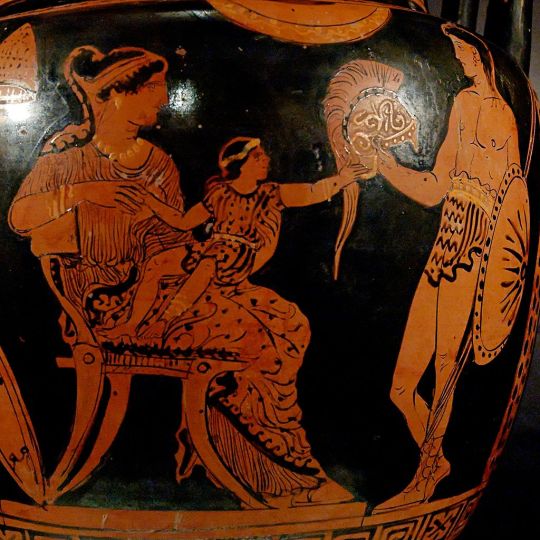
(incidentally, this particular piece depicts the scene of Hector and his son with the helmet)
In gameplay, there would be a plot-mandated level up for Hector after the battle against that Shadow, and he would learn Enduring Soul at this point (survive a hit that would have been a KO and restore to full health).
His affinities would change slightly– he doesn’t become outright immune to anything, but he gains resistances to Strike and Slash damage, and also gains a weakness to Pierce.
He also gets a new Theurgy of course!
Return from Elysium: Any party member that is KO’ed after the Theurgy is activated is granted one auto-revive with full HP restoration, 25% SP restoration, and Heat Riser. It doesn’t revive party members who are already KO’ed when it’s activated, and it takes a lot out of Shinji to use it– he has a one turn cooldown after casting it before he can take another action in battle, and it can only be used once in any given battle. (But really, you shouldn’t need it more than once lol)
The name and general idea of the Theurgy was actually inspired by one of Shinjiro’s passive abilities in Persona Q: Return from Yomi, which has a chance of healing when his HP falls below a certain threshold.
YES, it IS INDEED hella broken even with the limitations we put on it! Shinji can have a ridiculously overpowered Theurgy. As a little treat. He’s earned it, and we think it’s appropriate that his final limit break is his only healing move :)
(and listen if Ken can have his busted as hell Theurgy, then so can our boy Shinji)
You’ll get to see it in action one day!
#shinjiro aragaki#persona 3#persona 3 reload#p3#still breathing au#sbau canon#sbau spoilers#sbau character profile#sbau Hector
27 notes
·
View notes
Text
Okay, I have something to confess… none of the deaths in The Iliad were sad for me. Aside from the amount of randoms dying, let's consider Patroclus and Hector here because I honestly don't remember the rest.
Patroclus: I genuinely couldn't be sad. Sure, I was sad about the characters' reactions to Patroclus' death (for example, Antilochus running and crying and Achilles' depressive episode), but not about his final battle itself. I'm sorry, guys, but it was funny to read him about to die being petty and saying to Hector something like "you idiot, you only killed me because Zeus and Apollo helped you. Face me alone and I'll kill you! I'll kill you multiple times! Anyway, Achilles is going to kick your ass hahahahahaha he's going to kick your ass SO MUCH". Like, dude, you're DYING. What's YOUR problem, you looked your KILLER in the face and said "actually ☝️ I can kill you". And okay, even if we think it's true that two gods helped Hector… MAN, WHAT KIND OF MIND DO YOU HAVE TO HAVE TO DECIDE THAT YOUR LAST WORDS ARE GOING TO BE ACCUSING YOUR KILLER OF BEING WEAKER THAN YOU. If I were Hector I would respond something like "man, fuck you, you're dying!!!"
Hector: I also couldn't be sad about the death itself. It was sad to see Priam begging, Andromache talking about being enslaved, etc. But the moment of the battle? Sorry, the battle was hilarious. In Book 16, Patroclus was there spitting blood and dying while still using his last breath to be like "I didn't lose, YOU will lose" to Hector (man that was petty) and Hector was like "Achilles? He's not going to kick my ass, I AM going to kick his ass". And then he goes and prepares to fight Achilles alone, despite his understandably worried parents, because he needs to defend the city and it's a touching moment and you understand Hector's decision, but you still feel like it's suicidal, but hey…he seems confident. And you think that this is where the typical epic fight will happen, especially since he responded to Patroclus' threat by insinuating that he would defeat Achilles. But no, he sees Achilles approaching with a murderous aura around him and decides that he's going to run. And he DOESN'T stop. They run around the walls of Troy while the Trojans watch…what is this, a stadium where you watch the action from above? And then you're like "man, how long are they going to run?" and apparently Athena thought so too because she goes and tricks Hector into stopping running. And then you think okay, now it's the epic fight. But no, they're throwing spears at each other and exchanging harsh words while Athena shows her favoritism by helping Achilles. And then Hector is dying and he's like "Paris and Apollo are gonna kill you!!!!" and Achilles is like "bitch, look at my face and tell me if I look like someone who wants to live."
And as an honorable mention, we have two other funny no-death-all-teasing moments!
One of them is Achilles running after Apollo. Bitch, I know you're mad, but that's a GOD. Hurting a god is already a rare feat, do you really think you're going to be able to kill him or something? You got your ass kicked by Scamandrius despiste your confidence (another hilarious scene, actually), man, Apollo isn't on your level. I KNOW YOU'RE MENTALLY UNSTABLE IN THIS SCENE, BUT MAN. Apollo actually taunting Achilles is also hilarious. He is a god that's thousands of years old and he's arguing with this guy who can't even be 30 years-old. This guy who, like, Apollo's stepmother (Hera) acts like he's just Thetis' baby (Hera defending Achilles be like: well, he was suckled on the divine breasts of Thetis! Thetis, a goddess! Goddess that I raised!!!). Like, man, I know you want to kill him, just kill him. No need to trade taunts like you're in the same position or something. My theory is that Apollo was in a bit of an Book 1 Achilles situation. Achilles wanted to kill Agamemnon, but Athena stopped him, so the only option left was to curse him. Apollo wants to kill Achilles, but fate exists and it's not Achilles' time to die. So okay, he'll do the second best thing: provoke him. Like, it is SO personal lol
The other moment is Aeneas. Apollo encouraging Aeneas to fight Achilles because his mother is Aphrodite and Achilles' mother is Thetis, and since Aphrodite is more powerful than Thetis, surely Aeneas is stronger than Achilles, right? Aeneas then goes on and gives Achilles a huge speech. He goes on and on about how his mother is Aphrodite, about how he won't be intimidated, about how he won't be just another one... then Achilles kicks his ass SO hard that Poseidon has to step in and take Aeneas away. And Achilles cares SO MUCH about Aeneas that he's like "oh, a god helped you. Okay then" and goes back to fighting. And let's face it, if Achilles had any interest in Aeneas, he wouldn't care that the gods want Aeneas alive. He literally commits sacrilege with Hector's and tries to go after Apollo, he just didn't go after Aeneas because he apparently doesn't care enough about him. Man, Aeneas, that was humiliating. All that confident speech for that.
I'm seeing a pattern here, actually:
Patroclus "I could kill you!!!" to Hector while being killed by Hector. Okay, man…but dead people don't fight! At least you can brag that you beat Sarpedon if you care so much about proving your skills even while you're dying, I guess.
Hector "hahaha I'll kick Achilles' ass, that threat doesn't affect me!" to Patroclus and then running after seeing Achilles. Running for his entire life if it weren't for Athena. Is this the swift-footed Hector we see running for the third time?????
Achilles "I'm the best of the Greeks! I'm the peak! I'm THE MAN" to Scamandrius and then having to desperately be saved. Dude was defeated by SCAMANDRIUS and thought he could chase APOLLO. GUY IS THE SON OF A NEREID AND ALMOST DIED IN THE WATER.
Aeneas "my mother is Aphrodite, your mother is Thetis. I'm the chad, you're the virgin. That's how we are, you understand?" and then having to desperately be saved. It's even funnier when you think about how he was like "well, his mom is Thetis and she is a Nereid, not a Olympian…" BITCH DIOMEDES ISN'T EVEN A DEMIGOD AND YOU WOULD DIE IF IT WEREN'T FOR APHRODITE. HOW THE HELL DID YOU THINK YOUR MOTHER BEING APHRODITE WOULD MAKE YOU STRONGER THAN ACHILLES IF YOU WERE NOT STRONGER THAN A GUY WHO IS NOT EVEN A DEMIGOD.
But well, Hector, Patroclus and Achilles are all characters I adore. Aeneas I don't have a strong opinion of, truth be told (no, I haven't read The Aeneid). And yes, this post is completely immature. I've made many posts giving serious opinions, let me be honest about how I felt in these scenes even if they weren't written to be funny.
32 notes
·
View notes
Note
Thoughts on Hektor of Troy? I feel like everyone either says he’s a perfect, noble warrior who’s just protecting his kingdom, and the other half of people say he’s just a cruel monster who killed Patroklos mercilessly. I feel like neither is really the case but I really don’t know anything about him so I can’t know for sure
Honestly I don't consider myself a Hector expert by any means but I do have thoughts on him and you asked for them so here goes!
You're right about this weird divide that exists with Hector, with people on one side thinking of him as this great, noble warrior that is a paragon of virtue and honour, and on the other side people who think he is cruel and wrong for killing Patroclus. I don’t agree with either of those takes lol I find them very shortsighted and frankly completely unjustified. Like, it always felt to me like the people who fall on either side of this divide just never read the Iliad or that they didn't read the same Iliad I did 😂 and I'll explain why.
So, who is Hector, really?
Hector is the eldest son of Priam and at the head of the Trojan army. By the time the Iliad opens, it has already been ten years of war. Ten years of watching the Achaeans first pick his kingdom apart through raids, then kill his friends and family day after day on the battlefield. If the Achaeans are shown as being largely fed up with the war at the start of the poem, we can only imagine the state Hector is in. He has suffered loss after loss for years, he is under immense pressure to protect his country and his family while at the same time knowing that they don't have many chances. He is also shown to be quite fed up with his brother Paris' antics, and honestly who wouldn't be? Paris fucked around and Hector is the one to find out. I wouldn't want to be him lol.
But despite his resentment for Paris he still seems to be rather fond of him (even as he dresses him down lol), and we also know that he has a good relationship with Helen, that he is one of the few people in Troy who is kind to her. He is also shown to be loved by his wife, and he is tender with her and his son (personally, I'm not a huge fan of the Hector-Andromache scene in Book 6, I never found it as romantic as most people seem to find it, but that's neither here nor there). His character essentially in those first few books is built up to show us a family-oriented person who wants to do good and protect his family and his kingdom, but later on we see that he doesn't really go the best way about achieving that.
Throughout the rest of the epic he seems to make wrong decision after wrong decision, often having to be bailed out by the gods that protect him. He doesn’t listen to Andromache's advice to stay behind Troy's walls, and instead rashly challenges the Greeks to a duel. Great Ajax is chosen, and Hector gets his ass handed to him. He doesn’t learn his lesson; the next day he orders the Trojans to camp outside the city walls, and even though the Trojans gain the upper hand with Zeus' help, Hector's decision leaves them vulnerable. Once again he loses to Ajax, and only because of Zeus' help is he able to join the battle again.
And then we have the famous scene with Patroclus, the most cowardly killing in the Iliad essentially. He only manages the final blow on Patroclus because Apollo and another dude got to him first, and then has the audacity to take his armour as if he was the one to defeat him. When Achilles rejoins the battle and comes for him, Hector flees from him for a long while before finally facing him and his fate.
So like, to me, at no point in the Iliad are we led to believe that Hector is a paragon of virtue and bravery and better than Achilles or any of the Achaeans. We are shown his strength in battle, his protectiveness, his love for his family, but also his many mistakes and his less than admirable moments. His "killing" of Patroclus is laughable at best, but also I can totally get him for being cruel and maybe sort of venting his frustration on an easy target after all the misery the Greeks have put him through and the losses and humiliations he has suffered. It doesn't really make him a "hero" by modern standards but it does make him very human.
What do I think of Hector?
All in all, I have a lot of empathy for Hector. I think he is an interesting and layered character, and a worthy "antagonist" for the Achaeans, if you will. His is a shitty lot, but he's doing his best! I think that's what makes him so relatable and compelling to many people. But it's still strange, the way he's often put on a pedestal when compared to Achilles or any of the other characters in the story. I simply don't think that was ever the aim of the epic, and a careful reading would show that.
Everyone's free to like who they like, but I take issue with anyone who uses the Iliad as "proof" of Hector's superiority over Achilles, and it's done a little too often. Thankfully not as often nowadays as it used to, but the number of classicists and scholars who were actively sucking Hector's dick for the better part of the 20th century is frankly astounding. Reading some of these papers and books has had me rubbing my eyes in disbelief on occasion, wondering if we’re talking about the same characters or if one of us is hallucinating a version of the Iliad that the other is not aware of. On the one hand it's incredibly funny, on the other it's a little infuriating because how the fuck can one person be so goddamn wrong lmao.
I have some further thoughts on the perception of Hector as a character through the ages, a little rambly perhaps so feel free to stop reading here LOL
Hector through the ages
There's actually a very long standing tradition of Hector being viewed as the epitome of bravery, which exists at least since Roman times. The Homeric myths were very popular throughout antiquity and across the Greek-speaking world, and were later on "adopted" by the Romans, who unironically believed that they were descended from the Trojans who fled the sack of Troy by the Achaeans. Where the Iliad had been the cornerstone of pedagogy in Greece, the Romans created their own version of the epic in Latin, the Ilias Latina, which was a shortened version of the poem but was also thought to be the "correct" and "true" version of the events in the Iliad since it had been informed by "eye witness accounts" of the events of the Trojan War that apparently the Romans possessed.... yeah. Lol. Whatever
As you can imagine, this crude and condensed poem did not depict the Greeks very favourably. There are lots of inconsistencies btwn that and the Iliad, the characterisations are all over the place, lots of scenes are ommitted. Hector's "bravery" is grossly overstated and his more embarrassing moments are either altered to make him look better or don't exist at all. Achilles, naturally, is depicted as a crazed violent lunatic with no honour or regard for anyone but his "wrath". The Ilias Latina was not only popular in Roman times but was also studied widely in medieval times as part of teaching Latin in the western world, and I truly believe that it coloured the perception of the Iliad when it became popular again during the Renaissance. Also, as the one trying to protect his country and family, that would probably make Hector more sympathetic from a Christian POV..... (which is supremely weird, tbh, considering how much crusading the West had been doing in the Holy Lands for centuries by that time lol)
Which brings me to my next point, and that is how ironic I find it when the prevailing scholarship in countries and cultures that have done little but pillage and harangue the rest of the world (looking at you, Great British Empire) features such passionate defense of Hector-- who, for all intents and purposes, more closely resembles the people whose countries are being occupied and colonised rather than the other way round. The Achaeans being portrayed as "savage" for attempting to colonise and essentially commiting genocide on the "noble" Trojans.... idk, it's kind of cringe if you think about it lol. Achilles inevitably as the central character of the Iliad and the poster boy of the Achaeans gets a lot of flak, but like the most vitriolic analyses of Achilles' character and his role in the story as the "crazed, violent conqueror" and the most enthusiastic essays on Hector coming from places such as Oxford and Cambridge 🙄 looking in a mirror of your own making and not liking what you see, huh guys
I can sort of see how Hector would become even more popular during WWI and WWII times, with more and more people having to defend their countries and therefore relating to Hector doing the same, but I still find it a myopic interpretation of the Iliad as a whole. And it's an attitude that sadly persists to this day.
So, to wrap this up, do I like Hector? Sure. I have a lot of appreciation for him and how fleshed out he is as a character in the Iliad. Do I think that he has been historically used as the ultimate symbol of bravery, nobility and integrity by scholars with plenty of biases and a cultural/religious/political agenda? Hell yes, and those views have filtered down to how he is viewed by even the most casual enjoyers of the classics, or how he is portrayed in Holywood movies and the like.
Thanks for the ask!
16 notes
·
View notes
Note
Can ya please rustle up a picture of Penelope in my cowboy au?
@cowboy-iliad-au
Ofc! Though sorry it's not to my usual quality. I put alot of effort into some details to make up for slightly sloppy work, and decided to do multiple scenes. Version with less lighting under the cut, bc I phoned in the lighting as SAD hit me.
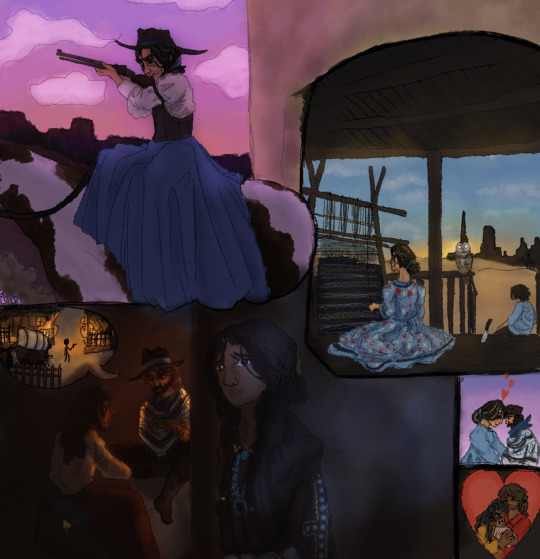
I noticed most of what you were getting was character designs so I wanted to focus some on actual scenes instead. We've got two scenes of Penelope, One chasing people off and another weaving. Ft. Owl Athena (I know she's not really an owl in the cowboy au, but I felt like including her as a treat) and Telemachus. One scene of what you described awhile ago of Cassandra overhearing Odysseus and Diomedes discussing and planning the raid on Troy.
And off to the side are two doodles of Penelope and Odysseus and Hector and Andromache respectively.
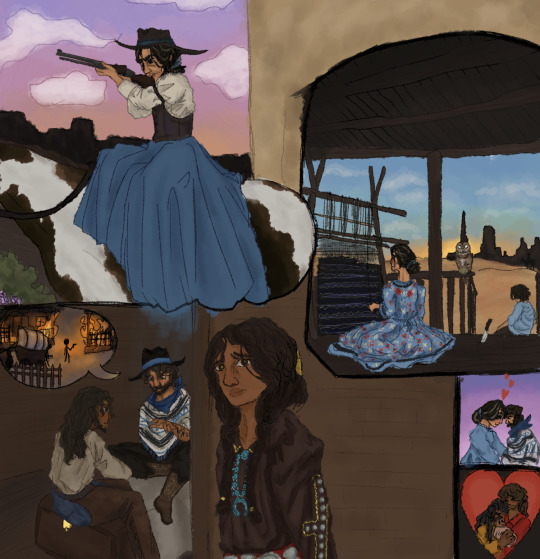
29 notes
·
View notes
Text
It’s too early to really speculate much on what Ilium but I do have one thought I want to share.
What if we get the scene from the Iliad where Hector says goodbye to Andromache and Astyanax for the last time. And what if in the song we hear Astyanax’s theme from Epic play? How much will that hurt?
9 notes
·
View notes
Text
hector and andromache rant bc someone reblogged an older post i made about them
THEY ARE SO TRAGIC (and i love tragic couples). like andromache represents the suffering of all trojan wives!! hector and her loved each other so much, that one scene in the iliad with them and astyanax fucking broke me, because i knew that hector will die. moreover, helen was there and she basically said that she thinks hector is hotter than paris but in the already mentioned scene in the iliad that hector is nevertheless so in love with his wife and his son. also after hectors death, andromache does not only lose hector but also her son. so when you take the versions where neo kills astyanax and not odysseus, she is the slave and has to sleep with the son of the man who killed her husband who also killed her son. i love them so much. they are so underrated. sometimes i pretend nothing bad happens to them and they live happily ever after.
70 notes
·
View notes
Note
Heyo!!! :D Some questions for you!
What are some of your fave parts of the Iliad and Odyssey? And then do you have a favorite by Euripides?
How long have you been drawing?
Since your "lovable little bastard" is a lil calico, does she have any neat patches/spots that are cute? Example, Teddy has a big stripe that curves across her neck, so I like imagining her having "necklace" haha. Does your lil lady have any spots that are cutely shaped? 🥺
(Good luck in school! :D Know I'm rooting for you!)
hello hello :DD this is a much needed break from studying oh god thank you.
For The Iliad,, BOOK 6, THE HECTOR, ANDROMACHE AND ASTYANAX SCENE. Book 10 also slaps obviously, night raid my beloved. The laments over Hector in book 24 too :')) It never fails to make me cry. But there's a tiny little specific part of The Iliad that is my absolute favorite - when Menelaus tells Antilochus that Patroclus was killed:

Idk man it feels so real and raw and hngngng. And Antilochus my man.
Now for The Odyssey i'm basic af but it's the reunion wih Telemachus, Penelope and Laertes :') hits right in the feels. The marriage bed story. The orchard. God fuck. Also the several little moments when Telemachus and Odysseus just,, exchange knowing smiles or glances with each other (when Odysseus is disguised as a beggar). It's just so neat i don't know why. Telemachus doesn't even know Odysseus and Odysseus doesn't know who his son is (yet!!), but they just kind of clicked together (when it came to scheming and plotting ofc. It's in their genes).
Tbh I haven't read too much of Euripides, I have quite a few plays sitting on my bookshelf waiting to be read. So i should probably, yknow, do that hahaa. But my favorite so far is Iphigenia at Aulis! It's just so heartbreaking and tragic and painful and ahdbagshjj. mannn.
I started drawing since I could hold a colored pencil lmaoo. i just did it sometimes as a kid, i liked it and was seen as the "art kid" in school (now that I think of it, I was actually more the "a pleasure to have in class" kid,, but hey i was the one people ran to during art projects lmaoo). It was 2020 when I really wanted to get into it - especially digital art, since I've been drawing on my phone and the family computer with a mouse in godforsaken Gimp up to that point - and I got my first drawing tablet the same year! Funnily enough I started drawing humans about... 1,5 years ago?? I was actually, lo and behold, a warrior cats artist for a few years :'DD
NOW. SHE HAS SO MANY SPOTS THAT I ABSOLUTELY ADORE. For example, all her paws are white - but only one is black with a single white toe:

And she has some incredible markings on her face if i can say so myself:

Especially since the orange marking goes in a straight line across her face, it's so neat. And her fluffy white neck/throat marking :D
And thank you for school AGJSJSDHHH. I have my last test on Monday so I should be finally free next week! The worst tests are over now, thankfully. This is hell :')
#asks#actually i have no idea if my cat is a tortoiseshell or a calico.#since in order to be a calico a cat needs to have white markings i think??#and a tortoiseshell has only black and ginger.#i know my fur color names okay it's the warrior cats effect.
20 notes
·
View notes
Text





"....bright-eyed and fair, with a tall and beautiful body. She was modest, wise, chaste, and charming."




Andromache - Princess of Troy and Queen of Epirus
A princess of Cilician Thebe, the daughter of King Eetion, Andromache was the beloved wife of Hector, the famous Trojan prince and warrior, and thus crown princess and future Queen of Troy.
Her father and her seven brothers were killed by Achilles in the sack of Thebe. Her mother was taken as slave, ransomed, but died of illness. Andromache was courted by Prince Hector who, according to the Iliad, brought "numberless gifts to win her".
In the Iliad, Andromache and Hector have a deeply loving and tender marriage. The end of Book VI, the famous scene between Hector and Andromache and their infant son, Astyanax, is considered by most commentators to be the most moving in the Iliad.
Their happiness is doomed to end in tragedy, as Hector confesses that it is not the thought of Troy falling that troubles him, not even the thought of his father, mother and his people dying at the hands of the Greeks; but that of his beloved wife being taken as slave.
Hector's dire predictions were all to come true. He is eventually killed by Achilles, Troy falls, and his infant son with Andromache is slain.
After Troy was sacked, Andromache was taken as a slave and concubine by Neoptolemus, the son of Achilles. Neoptolemus had killed Priam, the king of Troy with the same violent temper his father was famous for.
Andromache bore Neoptolemus three sons – Molossus, Pielus and Pergamus. She was hated by his barren Greek wife, Hermione, who, seeing that Neoptolemus loved Andromache, thought that her husband's concubine was plotting to replace her. Hermione and her father Menelaus planned to kill Andromache and her son Molossus. This attempt was thwarted by Peleus' arrival and Neoptolemus' ultimate murder.
Once Neoptolemus had died Andromache married Helenus, who was a fellow Trojan captive, Hector's younger brother. A free woman once again and married to Helenus, she became Queen of Epirus, and bore a fifth son, Cestrinus. With her new husband, she founded a new city called "the new Troy". Andromache faithfully continued to make offerings at Hector’s cenotaph for the rest of her life.
After Helenus' death, Andromache left Epirus and spent the rest of her days in Pergamum – a new city founded by one of her sons, Pergamus. It was there that she died of old age.
#I love her so much 💙#I need a book based on her story so bad#andromache#hector x andromache#troy#the iliad#women of troy#hector#greek mythology#trojan war#hector of troy#mine*
46 notes
·
View notes
Text
Troy.
But way better.
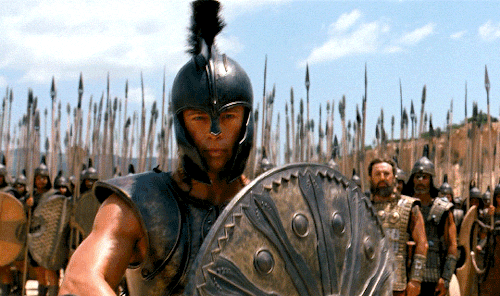
Rating: M
Legnth: 42 badass chapters (around 260k glorious words)
Warnings: A fair bit of blood, violent war scenes, sex, Zhao being a fucking coward and someone I really hate... and character death.
I can't tell you how much I hate the movie Troy... I hate it. It doesn't even follow the Iliad. Some of the events in the movie add up, but most don't and it's just... awful.
That being said, Annakpok is written way better.
It's more of a strategic war epic in the way that Homer's epic is rather than a full-on romance. Granted, romance is what caused the war in the first place if you haven't touched any of the Trojan War historics. The romance between Zuko and Katara is built up rather nicely and doesn't seem empty like in the movie with Hector/Achilles and Briseis/Andromache. The romance between Sokka and Yue is also not as empty as Paris and Helen in the movie (it's all Paris' fault anyway for choosing Aphrodite's offer, and he's an idiot. I would've gone for Hera's offer... actually, it's all Aphrodite's fault for being the crazed weirdo she is), and it's not even delved into in the Iliad itself, so eh. At least we don't have the lists (Godzilla, the lists of the freaking Iliad is... frustrating) or the very cringe worthy moments of the Troy movie (I hate it so much).
I digress.
This is not a bad review of this story. I love it. It's probably the best version of the Trojan War (without it being the Trojan War and set in the AtLA universe) that really works in other media. It was emotional, suspenseful, and freaking action packed.
Darius, level with me here... are you a history nerd like me who loves battle tactics and uses them in your works frequently? If so, I fucking love you.
The detail in this story is absolutely amazing, right down to the way weapons are used. I love it. Love love love.
I'm not going to give away too much, but I'm glad that the 'horse' was basically a checkovs gun. It works. It really works.
I could go on about everything for days!
But I won't because you guys really need to experience (yes, that's right, experience) it for yourselves. It is gut wrenching, emotional, I fucking want to kill Zhao myself, and Hahn can die five hundred times over for being a power hungry misogynistic idiot (I spit on his grave).
Actually, this story is pretty close to ASOIAF level writing with all its twists and turns.
The one thing that sets this story apart from the main script of Troy and the Iliad is the characters fates.
In Troy, Paris doesn't die, Helen runs away from Troy with him to live another day. In the Iliad, Paris dies. Helen goes back to her husband, who is very much alive, unlike in the movie, and yeah... then you go into the Odessy and several other epics like the Aenid and whatever. But anywho, great retelling of the Iliad/Troy in the Avatar universe.
Please check it out if you haven't already. It's basically an epic.
Story's Verdict: 10/10 turtleducks because I've never seen an author besides GRRM make me hate a character so much that I need to end them myself. I'm talking Joffrey and Cersei levels of hate. Mostly Joffrey... that little shiteater.

#probably the most crankiest review ive done so far#it took me four days to read this#i hate Troy#love the iliad#zutara#zutara troy/iliad AU#zutara fanfic#Story's Fanfic reviews
6 notes
·
View notes
Text
SECOND HALF in which the entire trojan war gets admirably shortened to about three songs
also closing thoughts about the entire thing
i was SO excited for hector having a song of his own but 'no turning back' is not the kind of song i wanted for him
it is really sexy that the trojan choir has both female and male members though, especially when they go "death to our enemies"
okay NOW there's a timeskip, haha. i was wondering how this would unfold. it feels very abrupt though. "oh god the greeks are gonna attack us" and then "well here we are ten years later, agamemnon what the hell are you doing with achilles' slave girl"
i wonder how in the weeds we're gonna get about achilles and agamemnon when this is paris' story
okay that is a fairly efficiently pared down version of the conflict, actually. briseis never gets mentioned by name but at least it conveys that achilles is fed up with agamemnon's leadership
hoho i LOVE the gentle emotion in quast's voice singing the line "agamemnon you divide us all / with your bitching and brooding"
i like patroclus having a point of view song about his feelings. "oh achilles the blood-stained killer... am i a part of you? are you a part of me?"
but then patroclus has to make it weird calling him "my sometimes father / my sometimes son" just guys being related dudes
i wish the guy cast as achilles could sound sad. but fine, he is SUPREMELY creepy and intimidating in all his non-emotional scenes, it's a tradeoff
OH AND ACHILLES AND HECTOR ARE ALREADY ABOUT TO DUEL. shit did we just do almost the entirety of the iliad in two songs. that IS efficient!
wait so if hector's about to die did they actually NOT do the "hector yells at paris for not being on the battlefield" scene?? in the paris-centered musical??
oh my GOD what IS hector's power ballad about love at THIS point in the narrative. "it's better to love and lose than to never love at all". is he singing that to andromache?? yeah like THAT'S the moral of hector's story...!
paris' shocked "you murdering BASTARD" at achilles is so funny. paris everyone's been fighting a war for ten years because you won't give up someone else's wife. everybody been murdering bastards for some time now
achilles at paris: "you may be good with women, boy / but you're no match for me" 🤨
ohhh so in this version paris asks aphrodite to preserve hectors corpse AND to guide his aim to kill achilles. which is narratively efficient but it bums me out that there is exactly one god in this entire trojan war
fuck YES the ulysses-in-disguise scene is a waltz. i go bananas whenever moments of deception are conveyed in 3/4
ulysses is so at a loss he prays to athena. ladies and gentlemen a second god has entered the trojan war!!
ULYSSES AGREES TO BECOME A HEAD WITHOUT A HEART!! he trades his happiness for athena to help him find a way to end the war. that is a very new direction to take the wooden horse and the odyssey but tbh i'm kinda into it
"we need to find a stooge / a fool / sinon, you're perfect!" "whuh?" KILLED ME
'inside outside' is awful and it just KEEPS GOING. WE GET IT YOU'RE DRUNK AND BURPING. NOT THE ENCORE. PLEASSSSE.
okay NOW helen finally says she loves paris, she's sounded very noncommittal and kinda humoring him about it up to this point honestly
oh and then there's a reprise of hector's love power ballad. THIS DOESN'T FEEL LIKE SOMETHING COMING FULL CIRCLE. WHY WAS IT HECTOR'S SONG TO BEGIN WITH AND ALSO HE SANG THAT LIKE. ONLY FOUR SONGS AGO
AND IT'S DONE.
okay yeah okay. i still think a good portion of the music is GREAT. digging the performances. and i have to remind myself it's a concept album because narratively it's kinda... there are some very unbalanced elements here. the complicated plot of the iliad is impressively pared down but then it kinda fails to focus back in on paris, he's missing through most of the second half, and ulysses takes over the protagonist role. also the whole "love conquers all" thing doesn't really work when it provably doesn't conquer anything on this occasion.
secondly, paris doesn't grow at all. he doesn't acknowledge his fault in the war, he doesn't acknowledge his fault in hector's death. he doesn't look back at the end and think about the things he's been through. it's just "i'll always love you mwah mwah. okay i'mma die now".
i'm still gonna listen to my favourite songs a billion times.
alright paris the musical liveblog let's gooooooo
FIRST HALF! watch me lose all principles whenever i think a melody is nice
like idk man the poster for this gives me that HE ONLY DID IT FOR LOVE thing with paris that doesn't appeal to me, that's why i haven't checked it out before. i feel they're gonna turn him into a hapless but sympathetic hero. bet there won't be an oenone. but here we go
IT'S SO EIGHTIES. I DIDN'T KNOW IT WAS THIS EIGHTIES. oh this is good actually
when homer (!) is dramatically presenting all the main players, in my mind i can't help but see them strike sassy poses as the spotlights hit them, their sequins flashing. "agamemnon! of mycenea!"
"ulysses! of ithaca! / longs for peace and security" i don't know if i like that as the main trait he's introduced with but okay let's see how he works in this paris-centered narrative
'head without a heart' IS SO GOOD. ohh it's just the kind of eighties' vibe i like.
oh this this framing might place the blame of the trojan war more at paris' feet than helen's, which i like, but also that he's just a stupid youngster, and that's interesting too: "Not some mad messiah of destruction and fire / Just a lovestruck youth"
ohhh and i LOVE paris interacting directly with cassandra! he never seems to do that in any adaptations. "Sister, please don't grieve / I've learned my part to the letter"
'straight ahead': HOLY SHIT GET HYPE. it's so extremely "cool protagonist is finally gonna live his life" opening number. it's weird to have paris be that kind of protagonist. but also it makes me think about how this poor shepherd boy was the WORST guy to make an ambassador, like cassandra IS right about that.
ugh i don't like when they put the weird histrionic plot stuff in the middle of a cool-ass song.
i'm dying at the others screaming at paris while he's like "the sea and sky :D my friends and i :D what could go wrong, what could -AAAAAAAAHHHH!!!"
paris falls in love with helen at first sight and assumes she's aphrodite. does aeneas know paris is weird about his mom. oh my god i just realized EVERYBODY'S weird about aeneas' mom, that's gotta be exhausting for him
"i married young, in love with power" oh it's one of those where helen's unhappily married. sigh. okay.
OH the way 'business' takes off after agamemnon's evil laugh. i'm appalled at the characterization but i'm just gonna have to roll with it because the music in this thing rocks
THERE HE IS! QUAST-PATROCLUS. who's like "ummmmm wHY are we having a meeting without my bestie achilles here"
OHH AGAMEMNON TRICKED ACHILLES SO HE WOULDN'T APPEAR AND BE VOTED COMMANDER. okay if we're doing evil agamemnon at least he's clever
oh this is a rum tum tugger-ass achilles omg. ohh i hate this but it's so funny. weakest character song so far
ahahaaa ulysses looking at paris' rags and telling him "To gain entry by disguise is an excellent ploy / I shall remember that, prince of Troy"
i enjoy helen being kinda exhausted by the whole thing. "Stop your adoration, I don’t need complications / I'm not a goddess, I am king Menelaus’ wife"
evil agamemnon using the abduction for his own political gain. hm. that makes sense actually (as long as he's evil i mean)
oh now 'thief in the night' establishes that menelaus really loves helen, i didn't expect that from this kind of framing. how is this gonna end now
HELEN HAS SUDDENLY KILLED SOMEONE? WHAT HAPPENED BETWEEN SONGS??
"I love her / I believe she loves me" I WISH SOMEONE WOULD ASK HER. I THINK IT WOULD BE GOOD TO MAKE SURE.
jon english who wrote this also plays hector and does NOT give himself enough songs to go ham on, god his voice is so good when he's PUSHING IT
4 notes
·
View notes
Text
Emily Wilson is a professor of classical studies at the University of Pennsylvania. Her translation of the “Odyssey” was published in 2017, and her translation of the “Iliad” will be published in September.
June 28, 2023
In one of the most moving and memorable scenes from the “Iliad,” the great Trojan warrior Hector says farewell to his wife, Andromache, who has urged him not to risk his life by fighting on the plain. He gives their baby back to her, tells her to go home, and reiterates his decision to advance on the enemy.
Around 100 complete English translations of the “Iliad” have been published over the past 400 years. Their variety shows no clear trajectory of cultural change: Some of the more recent Homers are more archaic and less idiomatic than many earlier ones, but some are not. A wide variety of forms are used to “translate” the dactylic hexameter of the original, including prose and free verse as well as several poetic meters.
The translations reflect a wide range of possible interpretations of this short passage. Is Hector harshly scolding Andromache for offering advice about the war, despite her gender? Or is he treating her with gentle pity? Is she worried only about her husband’s death, or is she also concerned about her own imminent enslavement and their baby’s slaughter? Are her concerns valid? Does the warrior risk his life despite his love for his family, or because of it? Why must men fight? Why must women weave? How strange, or how familiar, is the society of the poem?
Each of these translations — along with dozens more — suggests a different understanding of the central themes of courage, marriage, fate and death.
The Original ‘Iliad’ 6. 482-497
The original poem is composed in beautifully musical, metrically regular dactylic hexameter, and designed to be performed out loud: It is poetry for the mouth and ear, not the page.
The scene evokes the complex emotions of three separate characters — the frightened baby, the woman, the man — and it also includes a silent fourth, the enslaved nurse.
The text provides a vivid account not only of Hector’s words, but also of his actions. At the end of the passage, he picks up again the shining helmet that he took off because its plume frightened his little son, and in so doing, he becomes again “bright-helmed Hector,” as the traditional formula of heroic poetry describes him: He again assumes his role and costume as a man who lives and will die by war.
Before this passage, Andromache has pleaded with Hector to adopt a safer strategy, rather than go to almost certain death by meeting the enemy on the open plain. As she reminds him, Hector is risking much more than his own life. His death will entail his wife’s rape and enslavement, their baby’s violent death and the sack of their city.
Hector’s response suggests a fascinatingly contradictory attitude toward his own actions. His firm tone could suggest brash confidence and/or a man steeling himself for a heartbreaking choice to prioritize his own honor over the lives and freedom of everyone he loves — a choice that becomes possible only when presented as no choice at all.
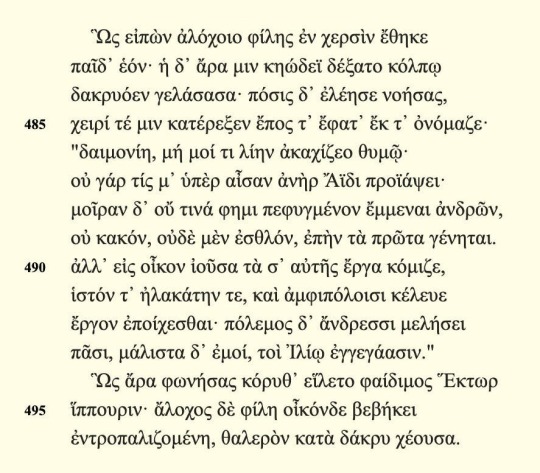
George Chapman (1611)
The first complete translation into English, by the playwright and erstwhile soldier Chapman, creates a staunch, fatalistic version of Hector, reflecting the poet’s interest in Stoicism. Chapman uses a metrical form that was already old-fashioned in his day, “fourteeners,” or rhyming heptameters; the original does not rhyme.
The translation expands on the original in ways that may be startling by modern norms — for instance, by rendering the single word for “tearfully,” dakruon, as “fresh streams of love’s salt fire.”
…This said, th’ heroic sire Gave him his mother; whose fair eyes fresh streams of love’s salt fire Billow’d on her soft cheeks, to hear the last of Hector’s speech ,In which his vows compris’d the sum of all he did beseech In her wish’d comfort. So she took into her od’rous breast Her husband’s gift; who, mov’d to see her heart so much oppress’d, He dried her tears, and thus desir’d: “Afflict me not, dear wife, With these vain griefs. He doth not live, that can disjoin my life And this firm bosom, but my fate; and fate, whose wings can fly? Noble, ignoble, fate controls. Once born, the best must die, Go home, and set thy housewif’ry on these extremes of thought; And drive war from them with thy maids; keep them from doing nought. These will be nothing; leave the cares of war to men, and me In whom, of all the Ilion race, they take their high’st degree.” On went his helm; his princess home, half cold with kindly fears; When ev’ry fear turn’d back her looks, and ev’ry look shed tears.
Alexander Pope (1715)
Pope’s translation, into elegant rhyming pentameter couplets, was a best seller in the 18th century and remains a classic. Pope adds a great many details entirely of his own invention, inserting anachronistic notions of marriage (“my soul’s far better part”), and explaining emotional responses that are unstated or ambiguous in the original: For example, Homer does not explain why Andromache is crying, but Pope clarifies that it is from “fear.” Pope invents some wonderful aphorisms that have no basis in the original but add zing to the couplet, such as “the first in danger as the first in fame.”
He spoke, and fondly gazing on her charms, Restored the pleasing burden to her arms; Soft on her fragrant breast the babe she laid, Hush’d to repose, and with a smile survey’d. The troubled pleasure soon chastised by fear, She mingled with a smile a tender tear. The soften’d chief with kind compassion view’d, And dried the falling drops, and thus pursued: ”Andromache! my soul’s far better part, Why with untimely sorrows heaves thy heart? No hostile hand can antedate my doom, Till fate condemns me to the silent tomb. Fix’d is the term to all the race of earth; And such the hard condition of our birth: No force can then resist, no flight can save, All sink alike, the fearful and the brave. No more — but hasten to thy tasks at home, There guide the spindle, and direct the loom: Me glory summons to the martial scene, The field of combat is the sphere for men. Where heroes war, the foremost place I claim, The first in danger as the first in fame.” Thus having said, the glorious chief resumes His towery helmet, black with shading plumes. His princess parts with a prophetic sigh, Unwilling parts, and oft reverts her eye That stream’d at every look; then, moving slow, Sought her own palace, and indulged her woe.
Samuel Butler (1898)
The prose version by the 19th-century novelist and satirist Butler — a lifelong bachelor — suggests a very different set of assumptions about women, metaphysics, emotions (“his heart yearned towards her” for eleēse, “pitied”) and even time management (“daily duties” for erga, “tasks”). Butler treats Homer’s repeated epithets as skippable, so that phaidimos Hector (“glorious Hector”) becomes simply “he.”
With this he laid the child again in the arms of his wife, who took him to her own soft bosom, smiling through her tears. As her husband watched her his heart yearned towards her and he caressed her fondly, saying, “My own wife, do not take these things too bitterly to heart. No one can hurry me down to Hades before my time, but if a man’s hour is come, be he brave or be he coward, there is no escape for him when he has once been born. Go, then, within the house, and busy yourself with your daily duties, your loom, your distaff, and the ordering of your servants; for war is man’s matter, and mine above all others of them that have been born in Ilion.” He took his plumed helmet from the ground, and his wife went back again to her house, weeping bitterly and often looking back towards him.
Robert Fagles (1990)
Fagles’s best-selling translation, in unmetrical free verse, uses many familiar American idioms and clichés (such as “smiling through her tears,” or “filled with pity,” a metaphor absent from the original). He softens the brusqueness of Hector’s final speech to his wife by rendering daimonie as the gentle “dear one,” and adding “trying to reassure her” and “please,” neither of which appears in the Greek.
Fagles makes Hector’s most iconic phrase, that men must be warriors, sound much chattier and wordier than the original, spreading it over two lines: “as for the fighting / men…”
… So Hector prayed and placed his son in the arms of his loving wife. Andromache pressed the child to her scented breast, smiling through her tears. Her husband noticed, and filled with pity now, Hector stroked her gently, trying to reassure her, repeating her name: “Andromache, dear one, why so desperate? Why so much grief for me? No man will hurl me down to Death, against my fate. And fate? No man alive has ever escaped it, neither brave man nor coward, I tell you — it’s born with us the day that we are born. So please go home and tend to your own tasks, the distaff and the loom, and keep the women working hard as well. As for the fighting, men will see to that, all who were born in Troy but I most of all.” Hector aflash in arms took up his horsehair-crested helmet once again. And his loving wife went home, turning, glancing back again and again and weeping live warm tears.
Emily Wilson (2023)
In my own translation of the “Iliad,” I echo the metrical regularity of the original by using unrhyming iambic pentameter. I thought long and hard about the multiple narrative perspectives suggested by the original poem, and its resonant ambiguities; in this passage, for example, I use both “beloved” and “loving” for phile — a word that could suggest either, or both — because the feelings of both the wife and the husband are at stake.
The rhetorically punchy qualities of Hector’s speech seemed essential, as well as Hector’s insistent focus on his own defining identity as a warrior. Hector is a deeply loving father and husband who makes the choice to leave his family to almost-certain enslavement and death.
As I read the Greek, we feel heartbroken for all three members of the family (or for all four, counting the silent nurse) — and all the more so because there is no hint of sentimentality in the language, no softness in Hector’s final words. The emotions are sketched with extraordinary concision: The only explicit feeling is Hector’s pity for Andromache’s tears (eleēse), but a world of other emotions is evoked through gesture.
…With these words, he gave his son to his beloved wife. She let him snuggle in her perfumed dress, and tearfully she smiled. Her husband noticed and pitied her. He took her by the hand and said to her, “Strange woman! Come on now, you must not be too sad on my account. No man can send me to the house of Hades before my time. No man can get away from destiny, first set for us at birth, however cowardly or brave he is. Go home and do the things you have to do. Work on your loom and spindle and instruct the slaves to do their household work as well. War is a task for men — for every man born here in Troy, but most especially, me.” When he had finished speaking, glorious Hector picked up his helmet with its horsehair plume. His loving wife set off for home, but kept twisting and turning back to look at him. More and more tears kept flooding down her face.
#emily wilson#quotes#the iliad#hektor#andromakhe#hektor x andromakhe#i know not everyone has nyt subscription but this is fascinating re:translation so i have provided the whole text under the read more :)#translation talk
285 notes
·
View notes